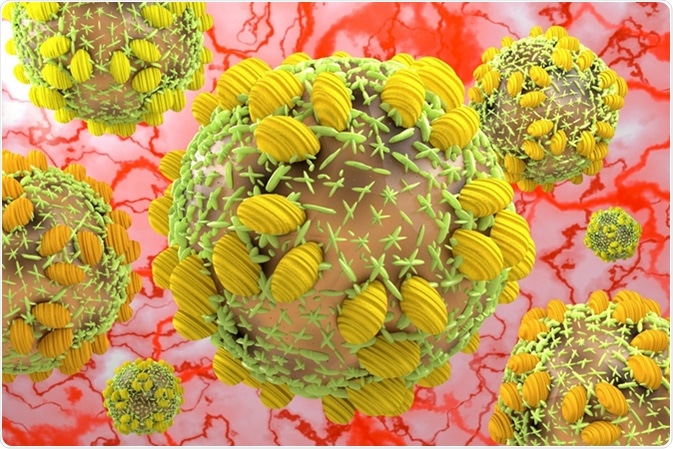Hepatitis C is a viral infection primarily affecting the liver. The hepatitis C virus (HCV) is spread mainly through contact with already infected blood. Its severity can range from mild illness that last for a few weeks to a more serious long-term permanent liver disease. The course of the illness can be classified in two broad categories;
- Acute Hepatitis C virus infection: Acute HCV infection is short-term in nature and usually arises within the first 6 months of exposure to the virus. Such an infection tends to develop into chronic infection.
- Chronic Hepatitis C virus infection: Chronic HCV infection occurs when the virus persists in the patient’s body for a long time. This can cause severe liver problems that may include cirrhosis (scarring of the liver) or liver cancer, and may last a patient’s lifetime.

Hepatitis C virus HCV 3D illustration. Image Credit: Fotovapl / Shutterstock
Symptoms of Acute Hepatitis C
While a majority (~70%-80%) of the infected people do not develop specific symptoms, there are cases of symptoms that may take anywhere between 2 weeks to 6 months (average 6-7 weeks) to develop after the exposure. Some of these symptoms are include mild febrile illness, loss of appetite, fatigue, nausea and vomiting, joint and muscle pain. In more serious cases patient may develop jaundice leading to yellowish discoloration of the skin, nail beds and whites of the eyes, darkening of urine and clay colored bowel movements. Jaundice may be associated with elevated serum alanine aminotransferase (ALT) levels >400IU/L.
Deal with it: Untold Stories of Hepatitis C in Canada
Prevalence and Transmission
There are estimated to be more than 4.1 million people in the United States with HCV infection, as per data from the National Health and Nutrition Examination Survey. This number could be higher when including homeless, incarcerated persons and HIV+ affected urban poor. While incidences of HCV infections have dropped significantly over the last three decades, HCV remains a significant threat to public health, given the absence of visible symptoms and thus, the potential for its spread from infected persons, who are unaware of the infection.
There are multiple ways for the Hepatitis C virus to get transmitted:
- IDU and the transfusion of unscreened blood and blood products (High Risk)
- Tattoos and piercings, needle sticks, and unsafe/traumatic sexual practices
While the risks associated with sexual transmission of HCV is considered to be low, the co-existence of HIV may potentially heighten this risk.
Diagnosis of Acute HCV infection
Diagnosis of acute HCV is made on the basis of the following criteria. One or more of the following three criteria need to be met.
- Antibody to HCV or anti-HCV test positive.
- HCV Recombinant Immunoblot Assay (HCV RIBA) positive
- Nucleic Acid Test (NAT) for HCV RNA positive
After any or more than one of the above are met, the following two criteria need to be met –
- IgM antibody to hepatitis A virus negative
- IgM antibody to hepatitis B core antigen negative
Treatment of Acute HCV Infection
Treatment of acute HCV infection depends on the progression of the disease. While on one hand early treatment can increase the chances of better treatment outcome, this is also true that treatment interventions during the acute phase may be potentially needless and harmful. Similar to chronic HCV infection, treatment in acute HCV infection is also based on therapy with interferons. Treatment might be necessary in cases of co-existing HIV infection.
References
Further Reading
Last Updated: Aug 21, 2023